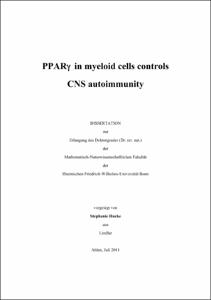Hucke, Stephanie: PPARγ in myeloid cells controls CNS autoimmunity. - Bonn, 2012. - Dissertation, Rheinische Friedrich-Wilhelms-Universität Bonn.
Online-Ausgabe in bonndoc: https://nbn-resolving.org/urn:nbn:de:hbz:5n-27815
Online-Ausgabe in bonndoc: https://nbn-resolving.org/urn:nbn:de:hbz:5n-27815
@phdthesis{handle:20.500.11811/5278,
urn: https://nbn-resolving.org/urn:nbn:de:hbz:5n-27815,
author = {{Stephanie Hucke}},
title = {PPARγ in myeloid cells controls CNS autoimmunity},
school = {Rheinische Friedrich-Wilhelms-Universität Bonn},
year = 2012,
month = mar,
note = {The nuclear receptor peroxisome proliferator-activated receptor gamma (PPARγ) is a ligand-activated transcription factor that regulates the immunogenicity of myeloid cells such as dendritic cells (DCs), macrophages, and microglia. In this thesis, we investigated two novel aspects of PPARγ-mediated modulation of immune responses.
First, we characterised the impact of PPARγ activation on cross-presentation of soluble antigen by DCs and subsequent cross-priming of naive CD8+ T cells. We demonstrated that treatment with the synthetic PPARγ agonist PIO significantly increased MR expression in DCs in vitro and in vivo which in turn resulted in enhanced MR-mediated uptake of the soluble model antigen OVA and elevated levels of cross-presented OVA. Importantly, after PPARγ-activation, DCs significantly upregulated the coinhibitory molecule B7H1 which impaired activation of naive CD8+ T cells and resulted in strongly reduced CD8+ T cell effector functions. Importantly, these data unveil a new mechanism of antigen-specific CD8+ T cell inactivation by DCs that results from increased cross-presentation and concomitant coinhibitory signalling via B7H1.
In the second part of this thesis, we revealed that during the effector phase of experimental autoimmune encephalomyelitis (EAE), PPARγ limits myeloid cellmediated autoimmune inflammation. We identified CCR2+Ly-6Chi inflammatory monocytes as the key myeloid cell population regulated by PPARγ and showed that a distinct population of inflammatory monocytes differentiated into microglial cells after infiltration of the central nervous system (CNS). PPARγ-mediated modulation of CNS myeloid cell immunogenicity resulted in dampening of both directions of myeloid cell – encephalitogenic CD4+ T cell interaction. Firstly, activation of PPARγ in CNS macrophages and microglia reduced the expression of MHC-II and CD40, both of which are important for local reactivation of autoreactive T cells. In line with this, we observed that TH1 and TH17 responses were diminished in the CNS. Secondly, PPARγ activation in myeloid cells increased the threshold towards T cell-mediated licensing resulting in reduced T cell-induced innate immune responses, i.e. production of nitric oxide or tumor necrosis factor-alpha. Hence, these data demonstrate that modulation of myeloid cell immunogenicity during ongoing CNS inflammation is a very effective strategy to interefere with reciprocal interaction of autoreactive T cells and CNS myeloid cells which critically contributes to cessation of CNS autoimmunity.
Taken together, the studies presented in this thesis identify PPARγ in myeloid cells as a promising candidate for the development of therapeutic approaches aimed at the control of excessive autoimmune responses. Importantly, we provide evidence that targeting PPARγ in myeloid cells interferes with ongoing inflammation in multiple aspects, namely with T cell priming and/or local reactivation but also with T cell-mediated licensing of myeloid cells.},
url = {https://hdl.handle.net/20.500.11811/5278}
}
urn: https://nbn-resolving.org/urn:nbn:de:hbz:5n-27815,
author = {{Stephanie Hucke}},
title = {PPARγ in myeloid cells controls CNS autoimmunity},
school = {Rheinische Friedrich-Wilhelms-Universität Bonn},
year = 2012,
month = mar,
note = {The nuclear receptor peroxisome proliferator-activated receptor gamma (PPARγ) is a ligand-activated transcription factor that regulates the immunogenicity of myeloid cells such as dendritic cells (DCs), macrophages, and microglia. In this thesis, we investigated two novel aspects of PPARγ-mediated modulation of immune responses.
First, we characterised the impact of PPARγ activation on cross-presentation of soluble antigen by DCs and subsequent cross-priming of naive CD8+ T cells. We demonstrated that treatment with the synthetic PPARγ agonist PIO significantly increased MR expression in DCs in vitro and in vivo which in turn resulted in enhanced MR-mediated uptake of the soluble model antigen OVA and elevated levels of cross-presented OVA. Importantly, after PPARγ-activation, DCs significantly upregulated the coinhibitory molecule B7H1 which impaired activation of naive CD8+ T cells and resulted in strongly reduced CD8+ T cell effector functions. Importantly, these data unveil a new mechanism of antigen-specific CD8+ T cell inactivation by DCs that results from increased cross-presentation and concomitant coinhibitory signalling via B7H1.
In the second part of this thesis, we revealed that during the effector phase of experimental autoimmune encephalomyelitis (EAE), PPARγ limits myeloid cellmediated autoimmune inflammation. We identified CCR2+Ly-6Chi inflammatory monocytes as the key myeloid cell population regulated by PPARγ and showed that a distinct population of inflammatory monocytes differentiated into microglial cells after infiltration of the central nervous system (CNS). PPARγ-mediated modulation of CNS myeloid cell immunogenicity resulted in dampening of both directions of myeloid cell – encephalitogenic CD4+ T cell interaction. Firstly, activation of PPARγ in CNS macrophages and microglia reduced the expression of MHC-II and CD40, both of which are important for local reactivation of autoreactive T cells. In line with this, we observed that TH1 and TH17 responses were diminished in the CNS. Secondly, PPARγ activation in myeloid cells increased the threshold towards T cell-mediated licensing resulting in reduced T cell-induced innate immune responses, i.e. production of nitric oxide or tumor necrosis factor-alpha. Hence, these data demonstrate that modulation of myeloid cell immunogenicity during ongoing CNS inflammation is a very effective strategy to interefere with reciprocal interaction of autoreactive T cells and CNS myeloid cells which critically contributes to cessation of CNS autoimmunity.
Taken together, the studies presented in this thesis identify PPARγ in myeloid cells as a promising candidate for the development of therapeutic approaches aimed at the control of excessive autoimmune responses. Importantly, we provide evidence that targeting PPARγ in myeloid cells interferes with ongoing inflammation in multiple aspects, namely with T cell priming and/or local reactivation but also with T cell-mediated licensing of myeloid cells.},
url = {https://hdl.handle.net/20.500.11811/5278}
}






